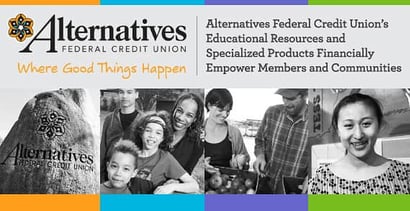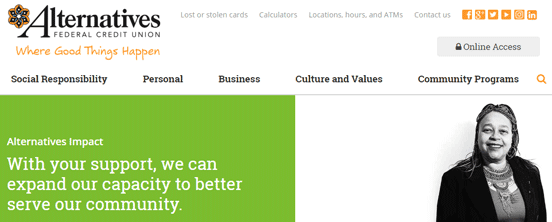

In a Nutshell: Ithaca, New York-based Alternatives Federal Credit Union has always tried to do things a bit differently than other mainstream financial institutions. Today, its mission has expanded to providing products and services that further help underserved individuals enjoy financial and personal well-being. These offerings include credit report analysis, counseling, and financial education for adults and children. Alternatives also works to improve financial health through Individual Development Accounts, free tax preparation services for low-income community members, and business development assistance. Because of this commitment to social responsibility that’s lifting up the Ithaca community, we’re recognizing Alternatives with our Editor’s Choice™ Award.
When Josh got a job in Ithaca, New York, he and his wife Kyle planned to move there and rent a home inside the city.
Only after putting their Albany house on the market did they realize the steep cost of renting and decided to instead buy a home in Ithaca. But when their house in Albany quickly sold, the pressure increased to close on a new house.
Now, in addition to juggling graduate school, family life, and a move, they needed to rapidly find and be approved for a mortgage. Luckily, Josh and Kyle found Alternatives Federal Credit Union, which put in extra effort to expedite the closing process and make sure the couple could settle into their new home on a tight timeline.
While this is just one example of the credit union going above and beyond, Alternatives has been providing unique banking experiences since it was chartered in 1979.
“Many entrepreneurs who wanted to start businesses were unable to get traditional lending. So we were the alternative,” said Eric Levine, Acting CEO and General Counsel at Alternatives. “Now, 39 years later, we do business lending, but that’s not our primary focus. That’s just one of the things we do.”
Alternatives is headquartered in Ithaca, and it serves Tompkins County, as well as the six surrounding counties. As a community development credit union, Alternatives is a member-owned, nonprofit institution dedicated to a traditionally underserved, moderate to low-income population.

Eric Levine, Acting CEO for Alternatives, told us its lending decisions are based on more than credit scores.
“Lots of people come to us who are unable to get a loan elsewhere because we do not make a decision on a loan solely based on credit score,” Levine said. “We look at the whole story. We go through the credit report. We spend time with the borrower and understand their situation.”
Alternatives’ commitment to its community and mission of upholding economic justice is evident in its free services and the specialized products for members. This is why we’re recognizing Alternatives Federal Credit Union with our Editor’s Choice™ Award for demonstrating a commitment to social responsibility.
Financial Education Fosters Personal Well-Being
Alternatives provides its members and those in its surrounding communities with the tools they need to succeed in personal finance and in life.
The foundation of this success is the education that helps members understand and effectively manage their money, and Alternatives’ commitment to this effort manifests through several strategies.
Counseling Helps Improve and Manage Financial Health
The first step in Alternatives’ free financial counseling service is a credit review. Certified financial counselors go over an individual’s report with them, provide information about how best to raise their score, and offer advice on paying down debts and further financial planning.
Alternatives’ approach to financial counseling and wellness is a holistic, personalized one in which counselors help people understand and take control of their spending and saving.
“They don’t say, ‘You shouldn’t spend money on this, you shouldn’t spend money on that.’ They just get people to realize where their money is going so they can judge for themselves whether this is really what they want to do,” Levine said.
A Partnership with BALANCE Provides More Counseling Options
Through its partnership with BALANCE, Alternatives offers additional free counseling options. BALANCE counselors can answer specific questions and give in-depth financial advice on topics like money and debt management, credit report analysis, housing, and foreclosure prevention.
Beyond bolstering Alternatives’ counseling resources, BALANCE provides important services for people who are unable to meet with a counselor face to face.
Money Wise Courses are Key Educational Assets
For those who prefer a more personal touch, Alternatives’ Money Wise financial education course meets one night per week for seven weeks. Attendees learn about income and debt, expense tracking, setting and saving toward goals, improving credit, avoiding predatory lenders, and many other topics.
The course’s method is based on expense tracking and empowering individuals to change their behavior, thereby improving their financial situation.
Accounts Help Kids Save for College
Designed as a financial literacy head start for those in elementary school, Alternatives’ Student Credit Union is a fun, interactive opportunity for young people to learn how to manage their money and build positive financial habits.
“We have a student credit union ‘branch’ in every elementary school in the Ithaca city school district. Once a week, we’ll come by, and, with Parent Teacher Association volunteers, we’ll accept deposits and get kids into a saving habit,” Levine said.
Students can also train as tellers and process transactions for their peers. In both cases, they’re gaining valuable experience with money and saving.
“Even if it’s just a quarter or a dollar, just the habit of doing it is really helpful. Having any amount of savings increases your chances of going to college exponentially,” Levine said. For that goal, Alternatives also offers the College Savers Club for elementary school students from low-income households. The account provides 10% APR and requires students to save $2 per week, helping them build funds for their future education.
Products and Services Benefit Members and the Community
Although Alternatives was founded with a mission to provide unique financial products and services, its scope has since expanded to include social change and economic justice.
The credit union pursues this goal by seeking to meet the financial needs of communities so they can become self-reliant and control their own growth. Here are a few examples of products and programs that are making a difference for members.
Individual Development Accounts Match Funds for Major Expenses
Individual Development Accounts help people move forward on a path toward asset ownership by matching savings with grant funding. This money can be used to purchase homes, pursue higher education, and to start or expand a small business.
First Home Club IDAs require account holders to save $2,000 over a period of between 10 and 24 months. Alternatives will then provide a quadruple match as a diminishing lien mortgage. No payments are required by the lendee, and the debt diminishes by 20% annually over the course of five years.
Alternatives also offers a 2:1 IDA for starting a business or acquiring professional assets. More details about these products are available on Alternatives’ website.
Free Tax Prep Service Helps People Achieve Better Refunds
Since 2003, Alternatives has prepared and filed more 24,000 tax returns, resulting in more than $44 million in refunds.
“Some people don’t even file their taxes. They may think they owe money or don’t make enough to bother, but they may not realize they’re entitled to an earned income tax credit (EITC) or a child tax credit. They may actually be getting a big refund,” Levine said. “Sometimes, people come in and they haven’t filed their taxes in years, and they walk out knowing that they’re going to get thousands of dollars in tax refunds.”

This free tax preparation service is based on qualifying income, and not credit union membership. By offering this service, Alternatives helps people get the returns they’re entitled to and improve the financial health of the community as a whole.
Business Development Assistance Grows the Local Economy
Another service Alternatives offers is Business CENTS for business owners seeking to develop their enterprise and for entrepreneurs working to start one.
This small business development program provides education in the form of individual consultations, classes, and workshops. The Coffee Talk program also provides access to peer mentoring and networking with other professionals.
A Living Wage Study Champions the Rights of Local Workers
“Around 1999, we had a staff member who couldn’t afford to live on the wage we were paying her,” Levine said. “So we did a living wage study and determined what it actually costs a single person to live in Tompkins County.”
Alternatives’ Living Wage Study is updated every two years and has been adopted by the Tompkins County Workers’ Center. Based on the information it contains, businesses can acquire certification that guarantees a living wage for their employees, setting a positive precedent for economic justice in the community.
Developing Products for Underserved Demographics
While the aforementioned products are all doing their part to promote better financial well-being, Alternatives is in the process of developing new offerings that will advance its mission of economic justice and community self-determination. Two of these offerings are the forthcoming auto lending and TransAction programs.
The auto lending program will help newly employed people and those who are re-entering the workforce finance a vehicle.
“We’re not going to require you to have a work history as long as we can verify you have an offer letter that’s been accepted, and you’re expected to start a job,” Levine said. “Then, we’ll give you the car loan so you can actually get to that job.” The loan conditions include a limit on the age and mileage of the vehicle to ensure that it is covered under New York’s Lemon Law.
TransAction is the product of Alternatives’ partnership with Planned Parenthood of the Southern Finger Lakes. Its purpose is to address the financial issues faced by members of the transgender community, such as the disparity between identity and official documentation. It will also address the need for financing at different stages of transition, such as for hormone therapy and wardrobe replacement.
Both of these, along with Alternatives’ other offerings, demonstrate the institution’s commitment to serving and ensuring the well-being of the entire community.
“It’s all equal here. We don’t have any VIP members,” Levine said. “Whether you have a checking account with $100 in it, or $1,000, or $100,000, you’re going to get the same exact treatment here.”
Advertiser Disclosure
BadCredit.org is a free online resource that offers valuable content and comparison services to users. To keep this resource 100% free for users, we receive advertising compensation from the financial products listed on this page. Along with key review factors, this compensation may impact how and where products appear on the page (including, for example, the order in which they appear). BadCredit.org does not include listings for all financial products.
Our Editorial Review Policy
Our site is committed to publishing independent, accurate content guided by strict editorial guidelines. Before articles and reviews are published on our site, they undergo a thorough review process performed by a team of independent editors and subject-matter experts to ensure the content’s accuracy, timeliness, and impartiality. Our editorial team is separate and independent of our site’s advertisers, and the opinions they express on our site are their own. To read more about our team members and their editorial backgrounds, please visit our site’s About page.
